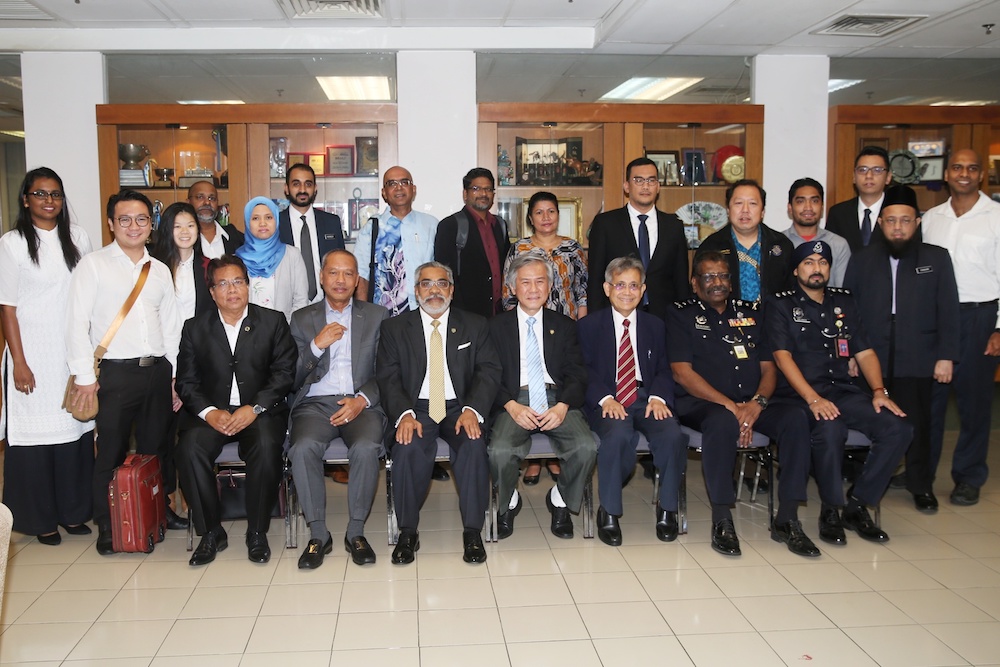KUALA LUMPUR, Aug 26 — The Malaysian Bar Council Task Force (MBTF) on the Independent Police Complaints and Misconduct Commission (IPCMC) wants the contents of the inspector-general of police’s (IGP) standing orders to be made public.
Co-chairman of MBTF Datuk Seri Ramachelvam Manimuthu said without the public knowing what the police standard operating procedures are it will be difficult to ascertain if a law enforcement official has overstepped his boundaries or if he is operating within his jurisdiction.
“If one looks at the Police Act, all misconduct comes from within the standing orders so if one excludes these from coming within the jurisdiction of the IPCMC there really won’t be much for us to do.
“It’s our view that we remove Clause 22.2 of the bill that says matters within Section 96 and 97 of the Police Act are excluded by the jurisdiction of IPCMC.
“This is a fundamental thing that must be done,” he said, after a meeting with various NGOs and human rights commissions today.

The standing orders detail how matters like arrests are made, treatment of detainees, as well as how and when a policeman can use his weapon.
In Malaysia, these standing orders are a secret. They are not made public and no one knows how a policeman must conduct himself.
The proposed IPCMC was among the 125 recommendations made by a Royal Commission of Inquiry formed in February 2004 following public uproar over a growing number of deaths in detention and police brutality claims.
The inquiry was tasked “to study and recommend measures to improve police efficiency, to make the force more effective in modern law enforcement and to turn the force into a respected and formidable enforcement body.”
At the last Parliament sitting, the IPCMC was tabled by Law Minister Datuk Liew Vui Keong and MBTF is hoping to get more clarity on whether it will be implemented and wants more discussions on it before Parliament resumes on October 5.
“In a more open and democratic society, the chief police officers are not covered by the Official Secrets Act.
“For example in the UK, Australia and provinces in Canada, the chief of police or police commissioners’ standing orders are publicly available documents. You can get them online,” said Andrew Khoo Chin Hock co-chairman of the Constitutional Law Committee and a human rights lawyer.
“So it’s a bit ridiculous that Malaysian citizens can find the Royal Canadian Mounted Police standing orders but don’t know what our Bukit Aman standing orders are.
“The reason why these things must come to light is that we need accountability and transparency.
“We need to know if there’s a breach of rules but how do we do it when we don’t know what those rules are. That’s why we must declassify these standing orders and other regulations made by the police,” added Khoo.

Ramachelvam said as far as police discipline issues are concerned, the police can handle that but all other matters must fall under the IPCMC’s purview.
“Our view is so far these regulations have not been done and the standing orders haven’t been revised.
“There can be some exclusions by way of regulations and do not have to be excluded from the principle bill from 2005.
“If you include it in now, then all conduct by the police are still included in Section 96 and 97,” said Ramachelvam.
Ramachelvam, when asked why the IGP was excluded from the IPCMC bill, said the reasoning given to them is that the IGP like senior government servants come under a different discipline regime.
“They seem to say the IGP like the chief secretary and attorney general come within a different discipline regime for senior government servants.
“The chief secretary will appoint and be a member of that tribunal and since it’s an existing process, they want to follow that process,” Ramachelvam explained saying this was communicated to them by the authorities in their previous meetings.
After 14 years, the proposed commission remains but an idea.
Instead what had come in its stead is the Enforcement Agency Integrity Commission (EAIC), formed during the Tun Abdullah Ahmad Badawi administration in what critics described as a “cosmetic” move that pandered to police pressure.
Close to the proposed IPCMC, the EAIC oversees the disciplinary conduct of all enforcement officers. But while it has the power to conduct investigation, it cannot prosecute and can only recommend action.



















